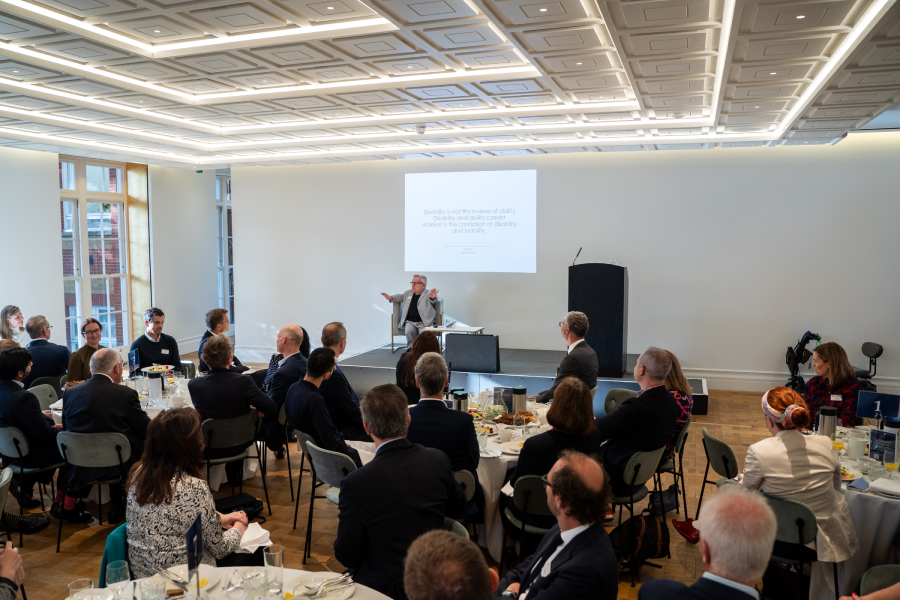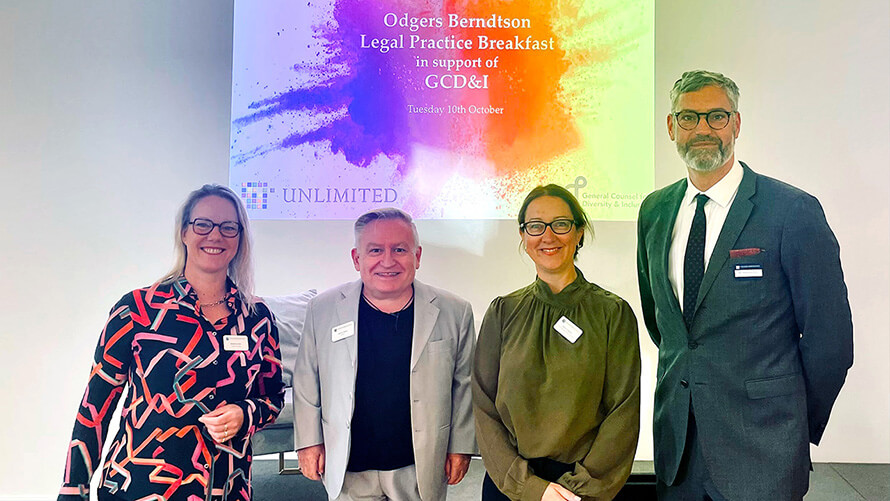Earlier this month our Legal and Professional Services Practice hosted a talk, in support of the General Counsel for Diversity & Inclusion initiative (GCD&I), with Simon Minty, a public speaker and disability consultant advising organisations on disability strategy, training, and, policy.
The Head of our Legal Practice, Alex Hamilton-Baily, introduced the event, talking first about our own recruitment initiatives, as well as those in our board and diversity consulting practices. We then heard from GCD&I Board Member Maaike de Bie (Vodafone) and Helen Ouseley (Freshfields), who are both heavily involved in the GCD&I Disability Workstream.
Simon Minty gave insight into best practices, and explained how organisations can become more accessible to those with disabilities.
Disability is a complex and broad issue. The majority of disabilities are not visible, and long-term conditions are often overlooked or misunderstood. Over half of employees with disabilities feel excluded in the workplace, and less than 70% are not open about their disability. From our own candidate data of tens of thousands of individuals, over 20% of them identify as having a disability. The question, therefore, is how can organisations become disability inclusive environments that attract and engage professionals with any form of disability?
Disability best practices
“Having a staff network which informs the business is game changing,” Simon said. “There’s a tendency for companies to push diversity then staff have to ‘do it on the side’ with no money for initiatives. But a well-funded network with time and investment ensures progress."
Other organisations are experts at the cultural aspect,” he continued. “They focus on getting people who have disabilities into the organisation with traineeships, and then getting them into the right roles once they’re in the organisation. It ensures retention.”
Commenting on multinational corporations, he said: “rather than developing practices for individual countries, you should take the best practices from individual locations, and incorporate them into an overarching best practice strategy for all geographies.”

Odgers Berndtson's Alex Hamilton-Bailey, Maaike de Bie and Helen Ouseley are joined by Simon Minty, Disability & Diversity Consultant, Trainer and Public Speaker.
Some organisations have a ‘life operating manual’, in which disabled employees explain “how they tick,” and share this with their managers, who can then understand their behaviours and needs.
Making accessibility “mainstream,” Simon explained, is how the best organisations get it right: “regardless of the disability, candidates feel they can call up an organisation and have a conversation about whether they can accommodate them.”
Part of this is the “unwritten rules” within all organisations. They can often be exclusionary, making it hard for people with disabilities to progress. Making accessibility mainstream through engagement surveys, senior leadership buy in, adjustment policies, measurements, and regular check-ins with staff, helps change these unwritten rules to create an inclusive environment for those with disabilities.
“Occupational health will be your biggest ally,” Simon went on to say. “Align them with HR, tech, procurement – build it all in at the start rather than adding it afterwards. And flexibility, including part-time and working from home are often appropriate for people with different disabilities.”
“Properly resourced employee networks led by those with disabilities are hugely powerful. So are career development programmes, which often help people see themselves more positively.”
“Training is paramount; from recruitment and interviewing, to performance management, organisations need to be actively training their people.”
“Finally – targets, not quotas lead to progress. Public targets give organisations something to aim for, and focus the mind.”
How do we get the balance right between over focusing on someone’s disability and helping them?
“It comes down to relevancy,” Simon explained. “If you see me struggling, offer me support. If I’m minding my own business, then you don’t need to. Make sure there’s a reason behind it, and don’t be afraid to engage and have a conversation about it.”
What are the most important disability adjustments organisations can make?
“Senior leadership commitment, measurements, and engagement. This means finding out how many people you have with disabilities, how they are supported and promoted, and what the flow of talent is into the organisation. People should feel a part of employee networks if real change is to occur.”
What are best practices for professional bodies?
“Professional bodies should identify what their members are doing well, and promote these to other members. Essentially, looking at what the best organisations are doing, and telling others about it.”
Have you seen great examples of companies celebrating disability?
“One company I know holds an annual disability day event to celebrate those with disabilities. It infuses disability inclusion into the company ethos, and for those involved in organising it, actually makes them better at their jobs.”
Disability remains an underserved part of inclusion and diversity, but Simon’s insights and knowledge demonstrate what can be achieved when organisations tackle the challenge head on.
If you would like to get involved with GCD&I or for more information, please visit their website.
Odgers Berndtson’s Legal Practice operates across the world, working closely with a breadth of organisations, from start-ups to FTSE 100 companies, to identify and develop legal and governance leadership. The practice serves three markets – supporting Chief Executives and Boards to find the right Chief Legal Officers, supporting those CLOs to build their leadership teams, and supporting private practice firms in their senior leadership.
To find out more about how we advise and help boards and leadership teams bring on the right talent, and to become more diverse and inclusive, contact: alex.hamilton-baily@odgersberndtson.com
To find out more about our Inclusive Recruitment Diagnostic Tool, contact: sue.johnson@odgers.com

Never miss an issue
Subscribe to our global magazine to hear our latest insights, opinions and featured articles.



